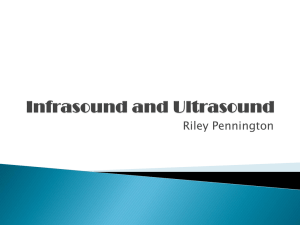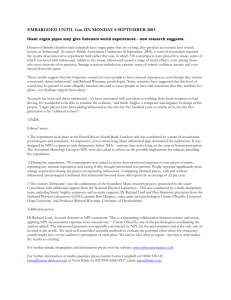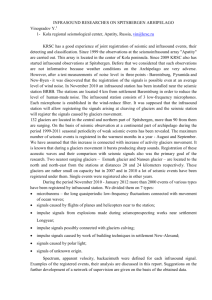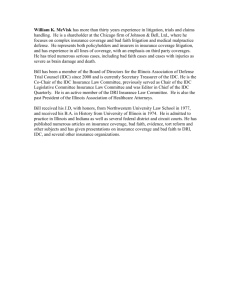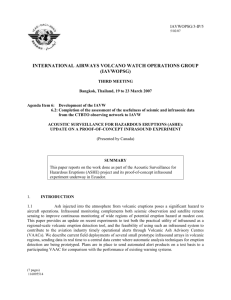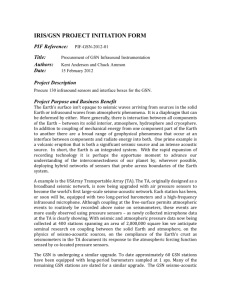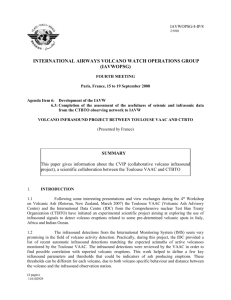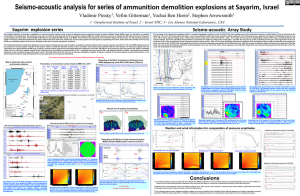3-06 Brachet
advertisement
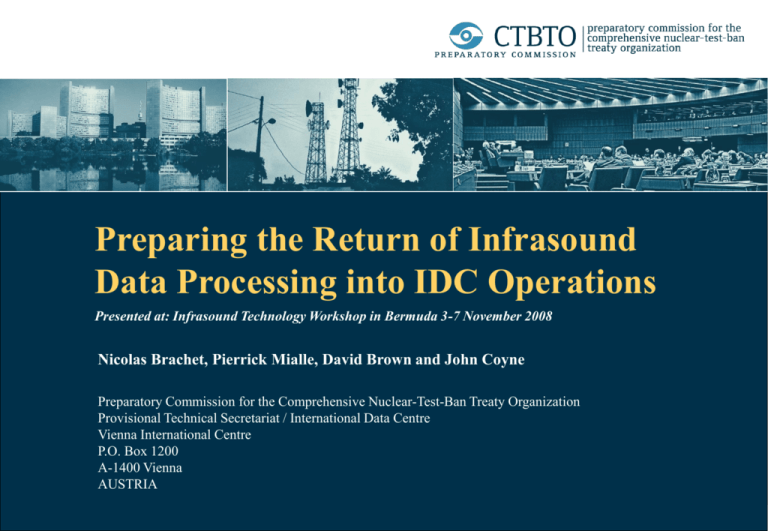
Preparing the Return of Infrasound Data Processing into IDC Operations Presented at: Infrasound Technology Workshop in Bermuda 3-7 November 2008 Nicolas Brachet, Pierrick Mialle, David Brown and John Coyne Preparatory Commission for the Comprehensive Nuclear-Test-Ban Treaty Organization Provisional Technical Secretariat / International Data Centre Vienna International Centre P.O. Box 1200 A-1400 Vienna AUSTRIA CTBTO/IDC Infrasound Technology Workshop in Bermuda, 3-7 November 2008 1 Outline of Presentation Final preparation for moving infrasound into operations Tuning the automatic infrasound processing Detection/detection categorization/phase association Interactive review of infrasound signals Enhancement of the automatic infrasound processing Station Noise characterization & Amplitude computation (cf. David Brown’s presentation) Atmospheric modeling (atm. specifications & simulation tools) CTBTO/IDC Infrasound Technology Workshop in Bermuda, 3-7 November 2008 2 Preparing the Return of Infrasound in IDC Operations CTBTO/IDC Infrasound Technology Workshop in Bermuda, 3-7 November 2008 3 Preparing the Return of Infrasound in IDC Ops Milestones Historical Operational Milestones • September 2003: Guidelines from CTBT/WGB/TL-2/79 “Significant effort should be directed into assessment and further development of infrasound tools for analysis. It is recognized that some existing tools (e.g. PMCC) show considerable potential for forming the basis for infrasound analysis, but are not yet in a form suitable for routine operations.” • March 2004: Infrasound are temporarily disconnected from network processing until a solution is found to reduce the number of (bogus) infrasound events in the IDC automatic bulletins. • July 2004: DFX-PMCC installed in Operations • November 2004: Detection categorization installed in Operations • July 2007: Interactive infrasound review tool (ARS-Geotool-PMCC) in Operations CTBTO/IDC Infrasound Technology Workshop in Bermuda, 3-7 November 2008 4 Preparing the Return of Infrasound in IDC Ops Milestones And also offline development & testing work … • 2006: Use of frequency-distance attenuation curve to reduce the number of false associations of infrasound detections • 2007: Preliminary analyst procedure & guidelines for saving infrasound events (selected infra started to be added to REB) • Ongoing: Enhancement of existing automatic and interactive software … Accomplishments in 2008 • New functions implemented in Geotool-PMCC interactive review tool • Prepare DFX-PMCC low frequency configuration for Solaris/Linux • Tune detection categorization • Work on Station Noise characterization & Amplitude computation • Tune GA to reduce the number of false associations with infra detections CTBTO/IDC Infrasound Technology Workshop in Bermuda, 3-7 November 2008 5 Preparing the Return of Infrasound in IDC Ops Tuning of the Automatic Processing Low frequency DFX-PMCC for Solaris (and Linux) • Objective: Enhanced detection capability, especially for distant events • Processing frequency bands between 0.07 and 4.0 Hz • Acceptable CPU time for Solaris machines (IDC Operations): Use of 11 frequency bands and duration of cross correlation windows between 30 and 60 seconds • Validation of the new detector configuration using the IRED* Example from IRED: Kasatochi eruption on August 8, 2008 detected at I22FR (New Caledonia), distance=8410km, signal frequency<0.1Hz *IDC Infrasound Reference Event Database CTBTO/IDC Infrasound Technology Workshop in Bermuda, 3-7 November 2008 6 Preparing the Return of Infrasound in IDC Ops Tuning of the Automatic Processing Tuning of DFX-PMCC for oceanic infrasound stations (I04AU, I05AU, I13CL, I14CL, I18DK, I27DE, I36NZ, I52GB, I55US) • Objective: Reduce the oversensitivity of DFX-PMCC to local ocean surf noise • IMS array configuration including very small aperture sub-arrays (~100m) may not be optimum for seaside areas 80m 130m 110m 1.5km 80m Robinson Crusoe I14CL Inner sub-array at I14CL CTBTO/IDC Infrasound Technology Workshop in Bermuda, 3-7 November 2008 7 Preparing the Return of Infrasound in IDC Ops Tuning of the Automatic Processing Tuning of DFX-PMCC for oceanic infrasound stations (cont.) Action • Do not start DFX-PMCC processing with too small inner triplet configuration or/and • Increase the required minimum number of detecting elements in an array to ensure distant elements also contribute to the final detection solution. CTBTO/IDC Inner sub-array at I14CL Infrasound Technology Workshop in Bermuda, 3-7 November 2008 8 Preparing the Return of Infrasound in IDC Ops Tuning of the Automatic Processing Results: The number of detections due to ocean surf decreased, with more stable detection attributes (back azimuth/trace velocity values) Example of I13CL (Easter Island), 26 October 2008 period 00:00-04:00UTC Before tuning After tuning 131 detections related to surf and microbaroms 74 detections related to surf and microbaroms CTBTO/IDC Infrasound Technology Workshop in Bermuda, 3-7 November 2008 9 Preparing the Return of Infrasound in IDC Ops Tuning of the Automatic Processing Tuning of network processing (GA) • Objective: reduce the number of false automatic associations with infra detections to a manageable level for analyst review (~10 to 15 automatic events per day) • Set up a testing/review environment (development LAN/InfraNet) and elaborate new infrasound criteria for GA Database Review signal detections & events All SHI events SHI events using new criteria InfraNet CTBTO/IDC Geotool-PMCC Infrasound Technology Workshop in Bermuda, 3-7 November 2008 IRED 10 Preparing the Return of Infrasound in IDC Ops Tuning of the Automatic Processing Tuning of network processing (cont.) • Positive criteria: retain only certain types of infrasound associations Large events: Events built with a minimum of arrivals from 3 primary stations (infra + eventually seismic), provided the first detected infrasound arrival is within 40 deg. Seismic events: Events built with at least 1 seismic phase detected on infra station (+ seismic phases on seismic stations) Significant events: Events including at least 1 significant infra detection (Cfreq between 0.4 Hz and 2.5 Hz ; family size>20 pixels ; family duration>120s), provided the first detected infrasound arrival is within 40 deg • Negative criteria: Give zero weight to very small low frequency infrasound detections (Cfreq<0.25Hz and family size<12 pixels) and reject events with less than 2 primary stations CTBTO/IDC Infrasound Technology Workshop in Bermuda, 3-7 November 2008 11 Preparing the Return of Infrasound in IDC Ops Tuning of the Automatic Processing Tuning of network processing (cont.) • Current statistics (on development LAN) with 37 operating infra arrays Daily average: Automatic SEL3 events 250 - 179 SEL3 events (SHI) 200 150 - 45 “infra” events before GA criteria 100 50 Total SHI CTBTO/IDC no criteria Before criteria 28-Oct 27-Oct 26-Oct 25-Oct 24-Oct 23-Oct 22-Oct 21-Oct 20-Oct 19-Oct 18-Oct 17-Oct 16-Oct 15-Oct 14-Oct 13-Oct 12-Oct 11-Oct 10-Oct 09-Oct 08-Oct 07-Oct 06-Oct 05-Oct 04-Oct 03-Oct 02-Oct 01-Oct 30-Sep 0 with criteria criteria After Infrasound Technology Workshop in Bermuda, 3-7 November 2008 - 17 “infra” events after GA criteria (min. 5, max. 32) 12 Preparing the Return of Infrasound in IDC Ops Tuning of the Automatic Processing Tuning of network processing (cont.) • Interactive review of the remaining automatic “infra” events after GA criteria Database problem Possible events 14 (8%) Validated events 9 (5%) Rejected events 150 (87%) Reviewed "infra" events Week-ends Comments: • The automatic bulletin contains ~1 valid event per day (usually including only 1 infra station), • Some possible events could not be validated (built with 2 infra stations), • The number of events built with infra stations decreases during week-ends (when there are fewer large detections related to human activity) CTBTO/IDC Infrasound Technology Workshop in Bermuda, 3-7 November 2008 13 Preparing the Return of Infrasound in IDC Ops Interactive review of infrasound signals More functional interactive review tool for infrasound data (update of Geotool-PMCC) Detection background at the station (24 hour summary) Linear/Log frequency scale Expandable panel for detection pixels (Azimuth, speed, consistency, correlation, RMS amplitude, number of detecting sensors, F-stats) Azimuth Various polar plots frequency Time Wind Automatic/Manual beam forming CTBTO/IDC Infrasound Technology Workshop in Bermuda, 3-7 November 2008 14 Enhancement of the automatic infrasound processing: Atmospheric modeling - Models and tools - CTBTO/IDC Infrasound Technology Workshop in Bermuda, 3-7 November 2008 15 Enhancement of the automatic infra processing Atmospheric models available at the IDC HWM93 Zonal winds at latitude 49N 2 March 2007 @15:00 GMT 160 160 120 120 ECMWF 80 Altitude (km) 160 120 + 80 G2S-ECMWF = 80 40 40 0 0 160 40 G2S-ECMWF 120 0 80 Longitude = 40 in progress… latest HWM07 (Drob et al.,2008) CTBTO/IDC 0 Infrasound Technology Workshop in Bermuda, 3-7 November 2008 16 Enhancement of the automatic infra processing Atmospheric models available at the IDC HWM93 Meridional winds at latitude 49N 2 March 2007 @15:00 GMT ECMWF 160 160 120 120 80 160 Altitude (km) G2S-ECMWF = 80 40 40 0 0 120 + 80 160 40 G2S-ECMWF 120 0 80 Longitude = 40 HWM07 CTBTO/IDC in progress… 0 Infrasound Technology Workshop in Bermuda, 3-7 November 2008 17 Enhancement of the automatic infra processing Atmospheric modeling: Tools New tools for infra atmospheric modeling at the IDC • Application for producing G2S-ECMWF models (Drob,2007) has been ported to 64 bit Linux • In June 2008, the IDC received a new software (WASP-3D sph.*, Virieux et al.) for simulation of infrasound wave propagation in a complex heterogeneous medium • WASP-3D has been enhanced in order to integrate real-time atmospheric variability (ECMWF data) and recent wind model (HWM07) • WASP-3D should help better understand the atmospheric propagation and be used at the IDC for comparison with other tools (e.g. Taupc, InfraMAP) Altitude (km) Traveltimes (s) 150 75 0 Source CTBTO/IDC VT Atmospheric Sonic Propagation 3D in Spherical Coordinates I26DE (km/s) 200 0.46 I26DE *Windy 800 0.36 1400 240 Infrasound Technology Workshop in Bermuda, 3-7 November 2008 300 Distance (km) 360 18 Enhancement of the automatic infra processing Atmospheric modeling: Case study (IRED) Novaky explosion (Slovakia), 2 March 2007 @ 15:28:04 GMT Poland Czech Rep. IS46 IS3 1 Slovakia Explosion REB Austria Hungary Source: EMSC and P.Labak 4500 km VRAC GERES IS46 2825 km Novaky IS31 IS26 SEL3 event built with 3 Infra+1 Seismic arrays Automatic location 75km from Ground Truth CTBTO/IDC 4 km Event location refined by analysts REB Location is 5km from GT Infrasound Technology Workshop in Bermuda, 3-7 November 2008 19 Enhancement of the automatic infra processing Atmospheric modeling: Case study (IRED) Novaky explosion, Waveforms and DFX-PMCC detections I26DE (350 km) CTBTO/IDC I31KZ (2825 km) Infrasound Technology Workshop in Bermuda, 3-7 November 2008 I46RU (4500 km) 20 Enhancement of the automatic infra processing Atmospheric modeling: Case study (IRED) Novaky explosion, WASP-3D ray tracing at I26DE using different atm. models Ray tracing (color=shooting angle) 100km I26DE Travel time curves (color=Trace velocity) I26DE HWM93 100km HWM07 100km G2SECMWF CTBTO/IDC Infrasound Technology Workshop in Bermuda, 3-7 November 2008 21 Enhancement of the automatic infra processing Atmospheric modeling: Case study (IRED) Novaky explosion, WASP-3D ray tracing at I31KZ using different atm. models Only stratospheric rays are displayed Is branches I31KZ It branches HWM93 50km HWM07 50km G2SECMWF 50km I31KZ CTBTO/IDC Infrasound Technology Workshop in Bermuda, 3-7 November 2008 22 Enhancement of the automatic infra processing Atmospheric modeling: Case study (IRED) Novaky explosion, Summary of ray tracing results (observed/predicted celerity and back az. deviation) I26DE I31KZ I46RU DFX-PMCC Cel. (m/s) 256 307 305 ∆Az (deg.) 0.54 0.91 1.85 Atm. models Taupc WASP-3D Sph CTBTO/IDC HWM93 G2SECMWF HWM07 HWM93 G2SECMWF HWM07 HWM93 G2SECMWF Cel. (m/s) 234 303 309 ∆Az (deg.) 0.85 -0.6 -1.0 HWM07 Cel. (m/s) 235 238 235 304-312 303-308 299-304 295-300 300-304 295-301 ∆Az (deg.) 1.2 1.1 1.0 1.55-1.8 0.95-1.35 0.7-1.4 3.5-4.0 3.0-3.2 1.75-2.1 Infrasound Technology Workshop in Bermuda, 3-7 November 2008 23 Summary Pre-requisite for moving infrasound into IDC Operations Tuning the automatic infrasound processing to reduce the number of bogus infrasound events down to a manageable level for analyst interactive review (~15 automatic infrasound events/day) Suitable tool for Interactive review of infrasound signals Analyst procedure & guidelines for building infrasound events Scheduled re-introduction of infrasound into Operations (beginning of 2009) Enhancement of the automatic infrasound processing New acquisitions at the IDC in 2008 for atmospheric modeling Atmospheric specifications: HWM2007, integration to G2S-ECMWF in progress Simulation tool: WASP-3D ray tracing Encouraging results, need for intensive testing and validation of the new models and tools on reference events (IRED) CTBTO/IDC Infrasound Technology Workshop in Bermuda, 3-7 November 2008 24
